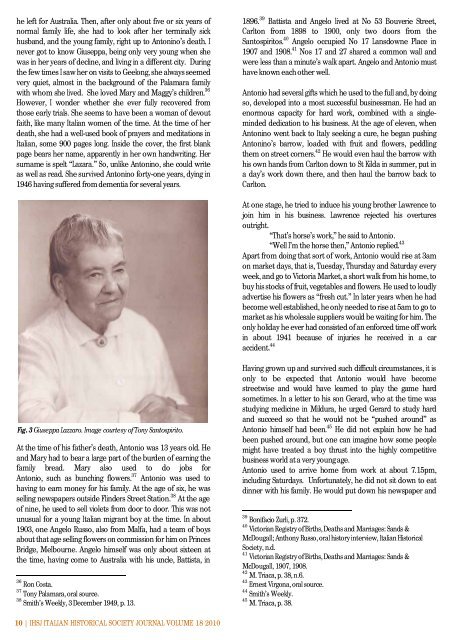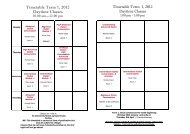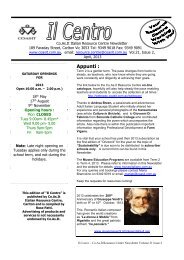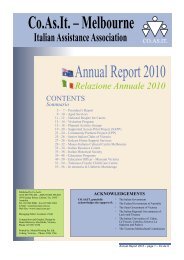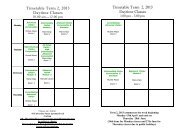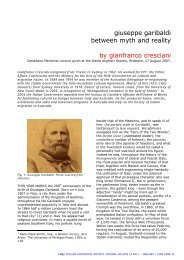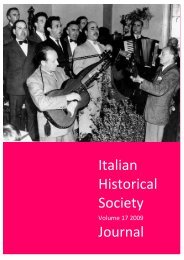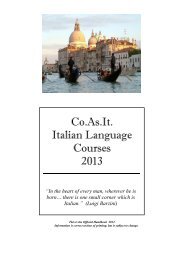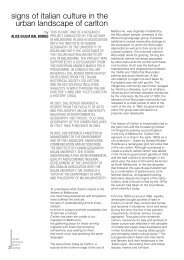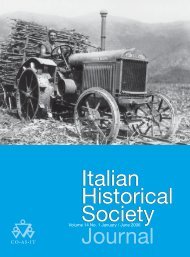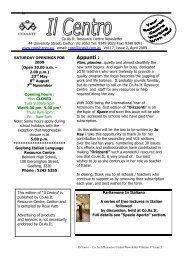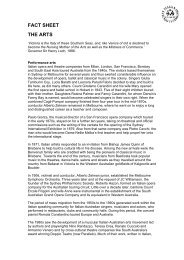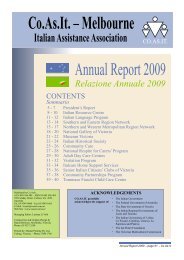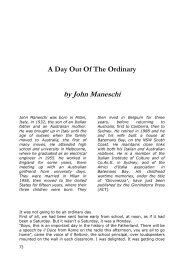he left for Australia. Then, after only about five or six years ofnormal family life, she had to look after her terminally sickhusband, and the young family, right up to Antonino’s death. Inever got to know Giuseppa, being only very young when shewas in her years of decline, and living in a different city. Duringthe few times I saw her on visits to Geelong, she always seemedvery quiet, almost in the background of the Palamara familywith whom she lived. She loved Mary and Maggy’s children. 36However, I wonder whether she ever fully recovered fromthose early trials. She seems to have been a woman of devoutfaith, like many Italian women of the time. At the time of herdeath, she had a well-used book of prayers and meditations inItalian, some 900 pages long. Inside the cover, the first blankpage bears her name, apparently in her own handwriting. Hersurname is spelt “Lazara.” So, unlike Antonino, she could writeas well as read. She survived Antonino forty-one years, dying in1946 having suffered from dementia for several years.1896. 39 Battista and Angelo lived at No 53 Bouverie Street,Carlton from 1898 to 1900, only two doors from theSantospiritos. 40 Angelo occupied No 17 Lansdowne Place in1907 and 1908. 41 Nos 17 and 27 shared a common wall andwere less than a minute’s walk apart. Angelo and Antonio musthave known each other well.Antonio had several gifts which he used to the full and, by doingso, developed into a most successful businessman. He had anenormous capacity for hard work, combined with a singlemindeddedication to his business. At the age of eleven, whenAntonino went back to Italy seeking a cure, he began pushingAntonino’s barrow, loaded with fruit and flowers, peddlingthem on street corners. 42 He would even haul the barrow withhis own hands from Carlton down to St Kilda in summer, put ina day’s work down there, and then haul the barrow back toCarlton.At one stage, he tried to induce his young brother Lawrence tojoin him in his business. Lawrence rejected his overturesoutright.“That’s horse’s work,” he said to Antonio.“Well I’m the horse then,” Antonio replied. 43Apart from doing that sort of work, Antonio would rise at 3amon market days, that is, Tuesday, Thursday and Saturday everyweek, and go to Victoria Market, a short walk from his home, tobuy his stocks of fruit, vegetables and flowers. He used to loudlyadvertise his flowers as “fresh cut.” In later years when he hadbecome well established, he only needed to rise at 5am to go tomarket as his wholesale suppliers would be waiting for him. Theonly holiday he ever had consisted of an enforced time off workin about 1941 because of injuries he received in a caraccident. 44Fig. 3 Giuseppa Lazzaro. Image courtesy of Tony Santospirito.At the time of his father’s death, Antonio was 13 years old. Heand Mary had to bear a large part of the burden of earning thefamily bread. Mary also used to do jobs forAntonio, such as bunching flowers. 37 Antonio was used tohaving to earn money for his family. At the age of six, he wasselling newspapers outside Flinders Street Station. 38 At the ageof nine, he used to sell violets from door to door. This was notunusual for a young Italian migrant boy at the time. In about1903, one Angelo Russo, also from Malfa, had a team of boysabout that age selling flowers on commission for him on PrincesBridge, Melbourne. Angelo himself was only about sixteen atthe time, having come to Australia with his uncle, Battista, in36 Ron Costa.37 Tony Palamara, oral source.38 Smith’s Weekly, 3 <strong>December</strong> 1949, p. 13.Having grown up and survived such difficult circumstances, it isonly to be expected that Antonio would have becomestreetwise and would have learned to play the game hardsometimes. In a letter to his son Gerard, who at the time wasstudying medicine in Mildura, he urged Gerard to study hardand succeed so that he would not be “pushed around” asAntonio himself had been. 45 He did not explain how he hadbeen pushed around, but one can imagine how some peoplemight have treated a boy thrust into the highly competitivebusiness world at a very young age.Antonio used to arrive home from work at about 7.15pm,including Saturdays. Unfortunately, he did not sit down to eatdinner with his family. He would put down his newspaper and39 Bonifacio Zurli, p. 372.40 Victorian Registry of Births, Deaths and Marriages: Sands &McDougall; Anthony Russo, oral history interview, Italian HistoricalSociety, n.d.41 Victorian Registry of Births, Deaths and Marriages: Sands &McDougall, 1907, 1908.42 M. Triaca, p. 38, n.6.43 Ernest Virgona, oral source.44 Smith’s Weekly.45 M. Triaca, p. 38.10 | IHSJ ITALIAN HISTORICAL SOCIETY JOURNAL VOLUME 18 <strong>2010</strong>
hand his wife, Lena, a bag of fruit. He would then go upstairs tocount the day’s takings, make telephone calls to his growersand wholesale buyers, and pay bills. He came down to have hisdinner about 8.30pm. His children missed the companionshipof their father, especially during their adolescence, butAntonio’s habits had been formed from the necessity toprovide for a family in his young days. Moreover, he himselfhad been deprived of his father as a baby and again from whenhe was just thirteen years old. So he had no role model to learnfrom.Antonio had a developed talent for the fruit and flowersbusiness. This came to the fore at an early stage. He must haveabsorbed all the business lessons Antonino could give him. Heused to be fond of telling me that when he was fourteen he hadthree men working for him. He called his business “AntonioFlorists.” The family wealth increased, gradually at first, andthen quickly. In 1911, they occupied No 29 Lansdowne Place, aswell as No 27. They used No 29 as their residence. 46 It waslarger than No 27 and also had a small rear yard.Two significant events occurred in 1915. Firstly, on 14 July, Marymarried Pietro Palamara. 47 After their youngest child, Tony, wasborn, in 1923, they went to live in Geelong. 48 Secondly, Antoniobecame the owner of 79 and 81 Bouverie Street, perhaps thefirst time he ever owned land. At that time, these two blockswere adjoining dwellings, each about the same size as 57Bouverie Street. Nos 79 and 81 Bouverie Street wereconsolidated on a single new title issued to Antonio. 49 By 1916,the family no longer occupied No 27 but occupied Nos 29 and31 and in 1917, also Nos 19 and 21. It was in 1917 that hepulled down the dwellings on 79 and 81 Bouverie Street andbuilt the two storey brick house which became well known inthe Italian community as 79 Bouverie Street. Antonio,Giuseppa, Maggie and Lawrence lived in the new house. 50 By1920, all the dwellings in Lansdowne Place had beendemolished and replaced by industrial buildings, some of whichare still there today.Maggie married Felice Costa in 1922. 51 They too went to live inGeelong. Antonio married Lena Virgona on 30 April, 1925 andthey started their married life in the new house at 79 BouverieStreet. It was probably about this time that Giuseppa went toGeelong to be close to Mary and Maggie and their children.The house at 79 Bouverie Street was built on the northern sideof the block up against the building next door, a fact lamentedby Lena in later years, because the only windows whichreceived direct sunlight were at the narrow front, facing eastonto Bouverie Street, and the equally narrow upstairs rear end46 NAA: Application by Antonio for registration as an alien, 1916.47 Victorian Registry of Births, Deaths and Marriages: 1915.48 Tony Palamara.49 Land Titles Office, Victoria: Certificate of Title, Transfer from Jeffries.50 Italian Historical Society (IHS): Santospirito Collection; Document SP-02566.51 Victorian Registry of Births, Deaths and Marriages.which looked west out over Lansdowne Place. She called it “adungeon.”The rest of the block was used mainly to serve Antonio’sbusiness. To store the items needed for the business, there was,at the rear of the house, the paper shed where the fruit bagsand the flower wrapping paper was kept until needed.Adjoining this shed was a much larger shed which housed thelaundry, shelves and cupboards. On the other side of the blockwas a shed where the barrow was kept, and a separate garage.Antonio did not acquire a car until about 1935. This was a FordV8. Lena had to be the family driver, as Antonio was very shortsighted. The rear half of the yard was brick paved. The front halfwas compressed earth. Here a great stack of empty fruit caseswere kept, awaiting recycling by wholesale fruit merchants, orfor packing flowers for wholesale, or for use as firewood in thefamily wood stove. Meanwhile, they also served as a greatplace for children to play in. Not a blade of grass grewanywhere.Antonio was extremely frugal in his living habits. He personallyenjoyed very few luxuries. In fact, he was frugal to a fault. Heexpected his employees to share the downturns of thebusiness. I recall one instance when business had been slow fora while. When pay day came up, one of his employees, oncounting the wage he had been paid for that week, stormedback to Antonio complaining aloud, “That’s kids bloody wages,Boss!” When I first went to work for Antonio, my first fourweeks went completely unrewarded. Finally, at the end of thisperiod he paid me five pounds ($10). I went back to him andsaid, “Is that all for four weeks work, Dad?” He wavedimpatiently and said, “Oh, I’ll give you the rest later.” He latergave me about two pounds more.Antonio, very early in his business life, learned the advantagesof bulk buying and he applied this principle to his floristbusiness. He kept in regular contact with the growers he boughtfrom as the season for each species of flower came on. Whenthey informed him their flowers were ready to pick he wouldtell them, “I’ll take the whole paddock.” 52 Sometimes he wouldgo up to one of his growers in the market, negotiate asatisfactory price and say to the grower, “I’ll take the lot.” In thishe was able to sell his flowers cheaper than anyone else. Healso kept in close contact with his wholesale buyers. He made atleast two trips to Tasmania on the “Taroona” for purposes ofkeeping contact. Apart from a trip to New South Wales,perhaps to Sydney, taking in a visit to the Jenolan Caves, theseare his only trips outside Victoria that I know of.One of his favourite methods of selling flowers quickly was tomake up a large mixed bunch, ready wrapped, and send me outonto the footpath at the corner of the lane, and loudly call tothe passing trade, “Fresh cut flowers, two shillings a bunch...Two shillings the lot.” Sometimes there would be one of us oneach corner. We sold a lot of flowers in this way, takingadvantage of the rush hour, and the drinkers coming out of the52 Ernest Virgona.IHSJ ITALIAN HISTORICAL SOCIETY JOURNAL VOLUME 18 <strong>2010</strong> | 11


